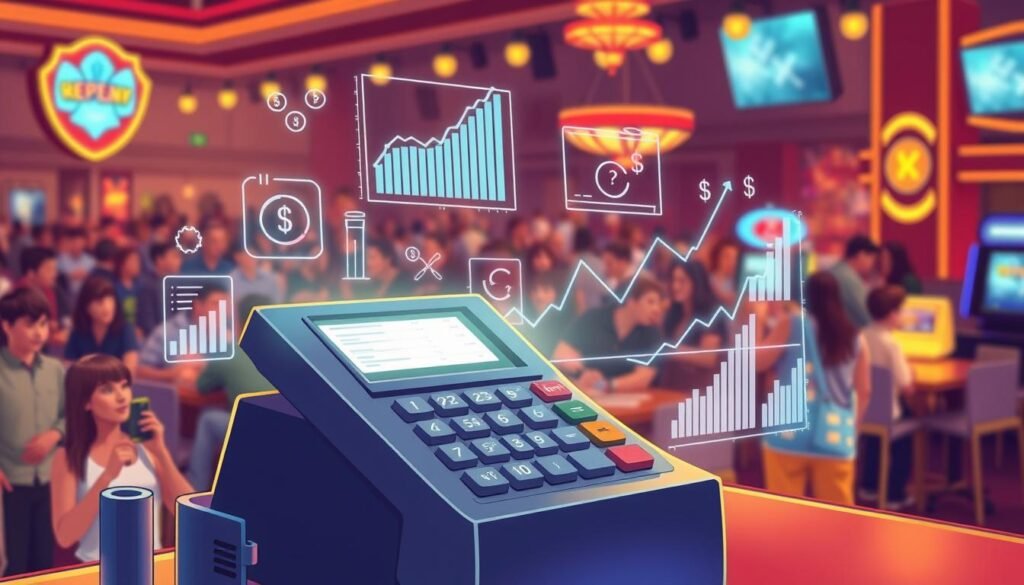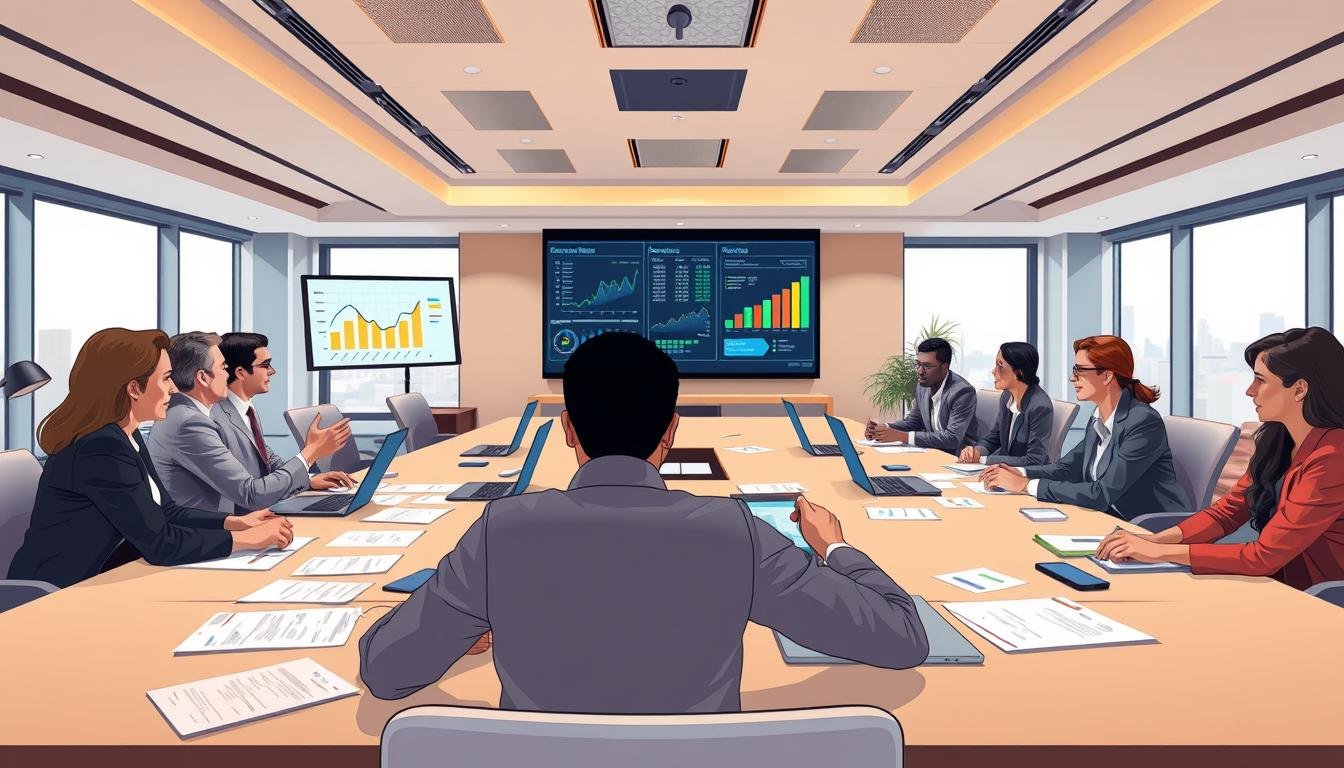Revenue management in entertainment venues
Imagine turning empty seats into gold without changing a single seat. The Taylor Swift ticket mess and Bruce Springsteen’s pricing issues highlight the power of revenue management. Broadway’s Hamilton made $160 million in one spot, and the NHL’s Vegas Knights hit $100 million in their first year. It shows that smart strategies can lead to huge profits.
Yet, many venues face challenges in balancing demand, pricing, and keeping customers happy. Let’s dive into how entertainment revenue strategies can turn these challenges into chances for profit.
Key Takeaways
- Dynamic pricing boosts revenue by matching prices to demand spikes.
- Hamilton’s success proves small venues can achieve massive revenue with smart pricing.
- Celebrity casting adds $250,000 weekly revenue for Broadway shows.
- Tools like AI and Prism optimize operations and customer experiences.
- Sustainability initiatives attract eco-conscious audiences, enhancing brand value.
Understanding Revenue Management in Entertainment Venues
Revenue management in entertainment venues aims to increase income through smart pricing and planning. This includes theaters, stadiums, and concert halls. It’s about matching ticket prices, extra services, and customer habits to increase profits. The strategies used are different from those in hotels or airlines, needing special approaches for live events.
The Definition and Importance of Revenue Management
Revenue management is about finding the right balance between supply and demand to make the most money. In entertainment, it’s about tracking things like ticket sales and how much people spend. For example, the Royal Opera House in London makes £40 million a year just from ticket sales. This shows how good pricing can really help entertainment businesses succeed.
How Revenue Management Differs in the Entertainment Industry
Entertainment venues are different from airlines or hotels because they use natural fences like special seats or exclusive events. Group sales are big, with 80% of sports fans going with friends or family. Fans also often choose to see their favorite band over cheaper options. This means entertainment venues need special strategies, like changing prices based on the artist or event.
Key Metrics That Drive Profitability
- Ticket yield: Shows how much money is made per seat compared to the total capacity.
- Per-cap spending: Tracks how much people spend on food, merchandise, and VIP packages.
- Attendance-to-capacity ratios: Shows how well events are doing in terms of demand.
- Ancillary revenue streams: Includes money from food, sponsorships, and partnerships.
Keeping an eye on these metrics helps entertainment venues make more money. For example, stadiums can increase spending by offering special food during big games. By using data to make smart decisions, venues can grow and succeed over time.
The Evolution of Revenue Management in the Entertainment Sector
Revenue management in entertainment venues has changed a lot. It used to be simple pricing, but now it’s all about using data. Venues now use technology to keep up with demand, just like airlines and hotels do.
Now, venues use dynamic pricing to change ticket prices based on how many people want to go. They track data in real time to make sure they sell the right number of tickets. This way, they make more money without selling out.
- Technology adoption: Software now predicts demand and automates pricing adjustments.
- Consumer adaptation: Fans increasingly accept variable pricing for premium events, valuing personalized experiences.
- Collaboration wins: Teams now integrate marketing and revenue data to target audiences, boosting ticket sales and ancillary revenue.
Today, 73% of entertainment firms make more money by selling merchandise, VIP packages, and hosting themed events. As revenue management in entertainment venues gets better, using technology and understanding customers leads to growth. This approach not only makes venues more profitable but also makes guests happier, showing that smart strategies lead to success.
Essential Components of a Successful Revenue Strategy
Good entertainment revenue strategies need to be both flexible and precise. Let’s look at the main parts that help entertainment venues grow their revenue:
Dynamic Pricing Models for Entertainment Venues
Dynamic pricing changes how tickets are sold. For example, Qcue’s method adjusts prices based on demand. This approach brought in $300M extra through 35 million price changes. But, it’s important to be transparent, like in 2022 when Springsteen’s surge pricing upset fans.
To balance making money and being fair, consider:
- Adjusting prices in real-time for popular events
- Offering discounts for early buyers
- Showing the value of premium packages
Inventory Management and Capacity Optimization
Group bookings are big in sports and live events. Here’s how to make the most of it:
| Challenge | Solution |
|---|---|
| Complex group sales | Use algorithms to segment seating blocks |
| Overbooking risks | Implement real-time capacity tracking |
Customer Segmentation and Targeted Marketing
Segmenting audiences can boost revenue. For example, student discounts attract younger people, while VIP tiers appeal to those who spend more. Key strategies include:
- Targeting based on demographics (like age)
- Using behavioral insights (like who comes back)
- Creating loyalty programs for long-term fans
Forecasting Demand in the Entertainment Industry
Accurate forecasts need:
- Looking at past trends
- Watching social media and what competitors do
- Considering weather and seasons
Modern tools like machine learning do better than old methods. They help entertainment industry operations make more money.
Leveraging Technology for Revenue Optimization
Technology is changing how entertainment venues manage their money. It turns data into plans that work. From AI tools to mobile apps, the right tech can make more money and make things easier. Let’s see how venues are using these new tools to do well.
Revenue Management Software Solutions
Advanced software makes pricing and inventory choices easier. For example, ASM Global uses AI to look at how guests act and change ticket prices on the fly. This helps teams spend more time with guests and makes more money by 5-15%.
Tools like Cloudbeds’ Pricing Intelligence Engine (PIE) have helped hotels raise their daily rates by 10-25%. This shows they’re useful beyond just hotels.
Data Analytics and Business Intelligence Tools
Data tools help understand what customers like and spend. Venues can see things like how many people come to events or how much they buy. Dashboards show trends, making it easier to find chances to make more money.
ASM Global’s F&B division, SAVOR, uses these insights to make menus that guests will like. This boosts sales of extras and makes guests happier.
Mobile Applications and Direct Booking Platforms
Mobile apps make booking easier and save money on fees. Venues like ASM Global’s venues use apps to offer special deals and loyalty programs. This encourages people to book directly.
These platforms also collect data, which helps with marketing. Direct sales not only save money but also build strong customer relationships. This leads to more visits and higher profits.
Pricing Strategies That Maximize Entertainment Venue Profits
Smart pricing is key in the entertainment revenue strategies world. Venues need to match prices with demand, what customers want, and costs. Start by looking at what others charge and what people can afford.
- Dynamic Pricing Models: Change ticket prices as events get more popular. Raise prices for sold-out shows and lower them for less busy nights.
- Tiered Ticket Packages: Offer different levels of tickets. More expensive seats or VIP access can cost more but offer more.
- Bundled Offers: Sell tickets with extras like merchandise or parking. This can make people spend more.
- Season Passes: Create subscription plans for regular visitors. This could be for theater or concerts.
| Strategy | Description | Example |
|---|---|---|
| Value-Based Pricing | Price based on what people think they’re getting (like seeing a famous person) | Charge $100 for a front-row seat at a big show |
| Competitive Pricing | Price like the competition but offer something extra | Lower ticket prices but add free meet-and-greets |
| Early-Bird Discounts | Give discounts for buying early to get cash flow | 20% off tickets if bought 60 days early |
To make more money in the entertainment sector, be open about costs. List fees clearly and offer extras like parking passes. Check sales data often to adjust prices and keep profits up without losing fans.
Ancillary Revenue Streams: Beyond Ticket Sales
Going beyond just ticket sales is key for revenue generation in entertainment industry. Streams like concessions, merchandise, and sponsorships open up new ways to make money. These strategies help entertainment venues make more money by offering extra services.

| Strategy | Example | Impact |
|---|---|---|
| Sponsorships | International Olympic Committee partners with McDonald’s ($100M over four years) | Secures funding and brand visibility |
| Merchandise | Big Ten Conference: $1M merchandise sales | Direct revenue boost through branded products |
| Media Rights | NBC’s $4.4B Olympics broadcast deal | High revenue through media contracts |
| Corporate Hospitality | Exclusive corporate packages | High-margin sales to businesses |
Food and Beverage Optimization
Boosting concession sales is crucial with entertainment revenue strategies. Here are some tactics:
- Premium pricing for craft beers and themed menus
- Layouts with high-traffic pathways
- Upselling through staff training
- Pre-order systems to reduce wait times
Wimbledon’s in-house catering, for instance, boosts spend by 20% through tailored menus.
Merchandise and Memorabilia Sales
Use key revenue tactics like limited editions and brand collaborations. The Big Ten’s $1M merchandise sales shows demand for event-specific items. Partnering with brands like Ralph Lauren, as Wimbledon does, adds value. Online stores extend sales windows, ensuring year-round revenue.
VI P Experiences and Premium Packages
Exclusive offerings like VIP lounges or meet-and-greets command premium pricing. Tiered packages (e.g., access to premium seating + behind-the-scenes tours) allow flexible pricing. Upselling standard ticket buyers to VIP tiers increases average spend per guest.
Sponsorships and Brand Partnerships
Align sponsors with venue values for mutual benefit. The IOC’s partnerships with Visa and General Electric provide funding while enhancing brand prestige. Crafting packages with measurable ROI—like NBC’s media rights deal—ensures sponsors see value, driving maximizing revenue in entertainment sector.
Seasonality and Special Events: Adapting Your Revenue Approach
Seasonal changes and special events offer chances to improve entertainment revenue strategies. By matching tactics with demand, venues can boost revenue growth strategies for entertainment venues. This way, they can make more money without upsetting guests.
During busy times, it’s key to be proactive with revenue management in entertainment venues. For example, during the 2024 Paris Olympics, prices went up by 180% in Paris Intra Muros. Tools like Anaplan and Excel help with accurate forecasts. Here’s how to get the most out of it:
- Peak Season Tactics:
- Use tiered pricing for special experiences (like VIP access at festivals)
- Release limited-time tickets to create a sense of urgency
- Off-Season Strategies:
- Host corporate events or workshops when it’s slow
- Start loyalty programs with discounts for off-peak visits
| Event | Location | ADR Increase | Occupancy Multiplier |
|---|---|---|---|
| 2024 Olympics | Paris Intraamuros | 180% | 2.5x |
| Super Bowl LVIII | Las Vegas | 130% | 1.0x |
For special events like the Super Bowl, venues need specific key revenue tactics for entertainment venues. To maximize profits, offer bundled deals (like tickets and merchandise) and strict no-cancellation policies. Adding themed pop-up events can also help by cutting down on cash flow swings by 40%. By pricing based on real-time demand, venues can keep making money all year.
Customer Experience and Its Impact on Revenue
Customer experience (CX) is key to entertainment venue revenue optimization. When fans feel valued, they spend more and come back often. They also tell others about their great experience. McKinsey found that better CX can increase revenue by 10–15%.
This shows it’s not just about selling tickets. It’s about creating memorable moments. These moments stay with people long after the show ends.
- Touchpoint 1: Ticket Purchase – Make online booking easy with clear prices and personalized suggestions.
- Touchpoint 2: The Event Experience – Clean facilities, friendly staff, and easy access to food and drinks improve satisfaction and sales.
- Touchpoint 3: Post-Event Engagement – Surveys and loyalty programs help turn one-time visitors into regulars.
Smooth experiences boost revenue generation in entertainment industry settings. For example, theaters with great hospitality see 2.4% more sales growth than others. Small changes, like faster entry or mobile ordering, also help.
These changes reduce hassle and increase spending on food, merchandise, and upgrades.
Most venues use AI to understand their audience, but 90% face challenges in using it well. It’s important to have both tech and human support. When customers feel heard, they’re more likely to come back, which helps revenue grow over time.
Begin with small steps: Train staff to greet by name or send surveys after events. Each interaction builds loyalty. Great CX is not just nice; it’s a way to make more money.
Revenue Management for Different Entertainment Venue Types
Every entertainment venue needs its own plan to make more money. From theaters to nightclubs, changing prices, inventory, and experiences is key. Let’s see how each venue uses revenue management in entertainment venues to increase profits.
Theaters and Performing Arts Centers
Theaters aim to balance art and money. The Royal Opera House in London gets 30% of its income from tickets. They use:
- Dynamic pricing for hit shows
- Donor partnerships for special shows
- Package deals with tickets and tours
Music Venues and Concert Halls
Music venues face issues like fan loyalty and price complaints. The 2022 Bruce Springsteen ticket issue shows the need for fair pricing. Effective strategies include:
- Clear pricing tiers
- Selling merchandise at events
- Loyalty programs for frequent buyers
Sports Arenas and Stadiums
Sports venues make money from premium seats and events. Paris Saint-Germain’s ticket sales are 13% of their revenue. They also earn over €100M from hospitality. Key steps are:
- Premium seating and VIP suites
- Season ticket discounts
- Hosting corporate events
Theme Parks and Attractions
Theme parks use tiered pricing to attract more visitors. Disneyland’s annual passes and special events encourage repeat visits. Top strategies are:
- Early-bird discounts for off-peak days
- Multi-day ticket bundles
- Special event packages
Nightclubs and Entertainment Complexes
Nightclubs focus on exclusivity and loyalty. Clubs like NYC’s Bowery Ballroom use:
- Dynamic cover charges based on demand
- Loyalty programs for regulars
- Private event bookings for corporate clients
Adapting strategies to each venue’s audience is crucial for success. Balancing pricing, partnerships, and customer experience leads to growth.
Building an Effective Revenue Management Team
Creating a skilled team is crucial for revenue management in entertainment venues. A good team needs to analyze data, think strategically, and know the industry well. Start by defining roles like revenue manager, analyst, and director. These roles handle forecasting, pricing, and making decisions.
| Role | Responsibilities |
|---|---|
| Revenue Manager | Monitors demand, adjusts pricing, and collaborates with sales |
| Data Analyst | Analyzes booking trends and forecasts using tools like Qcue |
| Director | Oversees strategy alignment with business goals and cross-department collaboration |
Training is essential. Use workshops and software like RMS tools to improve skills. For example, key revenue tactics for entertainment venues include dynamic pricing and tracking inventory. PSG’s 13% ticket revenue growth shows what skilled teams can achieve. NBA’s $9B ticket sales highlight the impact of aligned teams.
Encourage teamwork between revenue, marketing, and operations. Regular training and data analytics tools like Qcue (which boosted revenue by $300M) keep teams sharp. Share metrics like RevPOGS and RevPAS to align goals. Even small venues can start by pairing existing staff with outsourced experts until they build in-house expertise.
Continuous improvement comes from tracking performance and adapting tactics. Teams using revenue management best practices and real-time data will drive growth. They will overcome challenges like software complexity or limited budgets.
Overcoming Common Revenue Management Challenges
Even with revenue management in entertainment venues, challenges like market shifts and customer reactions can disrupt plans. To maintain stability, focus on adaptable entertainment venue revenue optimization tactics. Start by tracking real-time data to spot trends early. For instance, weather forecasts or event overlaps might require quick adjustments to pricing or promotions.
Adapting to Market Swings
Unpredictable demand? Use revenue growth strategies for entertainment venues like dynamic pricing. Pair this with tools like Mews’ 2D inventory systems to track dormitory-style bookings accurately. Forecasting tools can also highlight risks, letting you pivot faster than competitors.
- Track competitor pricing and inventory levels weekly
- Set price floors and caps for volatile events
- Run last-minute deals to fill unsold inventory
Handling Price Resistance
Customers may push back when prices rise. For example, Bruce Springsteen’s team faced backlash for sudden ticket hikes. To avoid this:
- Segment audiences into price-sensitive and premium tiers
- Highlight added perks like VIP access or merchandise bundles
- Communicate pricing changes via email campaigns explaining value
Surveys show 68% of fans prefer clear explanations over hidden fees. Use this to build trust.
Protecting Your Brand
German club Fortuna Düsseldorf offers free tickets to locals but offsets costs via sponsorships. This balances maximizing revenue in entertainment sector with community focus. Ensure pricing aligns with your brand’s identity:
- Family venues might freeze peak prices during school holidays
- Arts organizations can bundle tickets with concessions for perceived savings
- Use RMS platforms to automate consistent pricing across all channels
Proper revenue generation in entertainment industry requires balancing profit and brand equity. Prioritize customer trust while optimizing every dollar.
Case Studies: Successful Revenue Management Transformations
Real-world examples show how entertainment venue profit maximization turns challenges into chances. Here are three stories of venues using key revenue tactics to get great results.
A big concert venue teamed up with Qcue to change their pricing. They used smart pricing and inventory tricks, making 35 million price changes a year. This boosted their income by $300 million. It showed that even big venues can do well with smart systems.
A local theater doubled its profits by using smart pricing and focusing on donors. They used data to adjust ticket prices, matching donor support with artistic goals. This mix of strategies increased donor support while keeping tickets affordable for everyone.
A multi-purpose arena made more money by offering special experiences for different events. They used flexible seating and event-based pricing to meet their goals. Their approach, like Lapithus Hotel Group’s automated pricing success, shows how venues can adapt to different events.
These stories show how new entertainment revenue strategies can lead to growth. Whether through tech, partnerships, or flexibility, these examples offer lessons for any venue looking to increase revenue generation in a sustainable way.
Measuring ROI of Your Revenue Management Efforts
Tracking the success of entertainment venue revenue optimization starts with clear metrics. Use these steps to measure how strategies impact the bottom line:
- Calculate entertainment venue profit maximization ROI using the formula: [(Revenue – Costs)/Costs] x 100%. Compare ticket sales, merchandise, and sponsorships to expenses.
- Track marketing performance: Measure email open rates, social media conversions, and website traffic to gauge campaign effectiveness.
- Use tools like EventMobi and EventPipe’s Report Center to analyze revenue streams and rebates. Tools like Google Analytics highlight attendee engagement trends.
| Metric | Definition | Example |
|---|---|---|
| RevPASH | Revenue per available seat hour | Calculate revenue divided by total available seat hours for a concert |
| Sponsorship ROI | Brand visibility and lead generation | Track banner clicks and post-event survey responses |
| Attendance Growth | Year-over-year ticket sales comparison | Compare 2023 summer show sales to 2022 figures |
Post-event surveys show how happy attendees were. For example, a theater using Eventbrite saw a 30% ROI boost after adjusting prices based on feedback. Regularly check financial reports and engagement data to improve strategies. Small changes, like adjusting concession prices or offering premium packages, can increase profits without losing audience support.
Future Trends in Entertainment Venue Revenue Management
Technology is changing the entertainment world fast. Revenue management in entertainment venues is getting a big boost from AI, blockchain, and more. These changes will make operations and profits better.
AI and Predictive Analytics: AI is helping with demand forecasting and pricing. By 2033, the smart stadium market will grow to $38 billion. Venues like Mercedes-Benz Stadium use new tech to improve inventory and entertainment revenue strategies.
These tools help predict what people will do. This means venues can offer better promotions and prices. It’s all about making more money.
- AI-driven demand forecasting for maximizing revenue in entertainment sector
- Predictive analytics to balance inventory and ticket pricing
- Automated recommendations for upselling concessions and events
Personalization at Scale: Places like Tottenham Hotspur Stadium use data for personal experiences. They look at what people like and offer special deals. Key revenue tactics for entertainment venues now include loyalty programs and AR/VR previews.
This makes people come back more often. It also increases how much they spend.
Blockchain and Secure Transactions: Blockchain could fix ticketing problems like scalping. Companies like Ticketmaster and Live Nation are looking into it. It makes ticket sales fairer and safer.
Cryptocurrency and contactless payments at places like Madison Square Garden are testing new ways to pay. It’s all about making things safer and easier.
Looking to the future, venues that use these trends will lead. By 2030, revenue platforms will grow by 9.6% a year. The message is clear: use technology, focus on personalization, and make transactions secure. These steps are essential for success in a world driven by data.
Conclusion: Implementing a Winning Revenue Strategy for Your Entertainment Venue
Creating a strong revenue strategy in the entertainment world starts with clear steps. Focus on key areas like dynamic pricing and making decisions based on data. Use tools like revenue management software and analytics to track demand and boost ticket sales.
Making money from merchandise can add up to 30% of event income. Fans of K-pop are the biggest buyers, with 27% of them purchasing items. Offering unique designs and eco-friendly options can attract more customers and increase profits.
Training teams and setting clear goals helps everyone work towards profit maximization. Start by checking how much time staff spends on manual tasks versus automated systems. For example, using mobile booking platforms can cut costs and make guests happier.
Investing in tech, like software for $1,500–$15,000, can lead to big savings and better customer insights. Begin with small tests, like offering premium packages or seasonal tickets, to see what works. Use social media and local partnerships for marketing that doesn’t cost much.
Remember, 19% of fans already buy merchandise. Adding AR/VR previews or limited drops can create excitement. Balancing short-term profits with long-term brand health means focusing on customer happiness and financial goals. By using these strategies, venues can grow and stay competitive.
Source Links
- Revenue management in sports, live entertainment and arts – Journal of Revenue and Pricing Management – https://link.springer.com/article/10.1057/s41272-023-00432-y
- How an Events Program Revolutionizes Restaurant Revenue Management – https://tripleseat.com/blog/how-an-events-program-revolutionizes-restaurant-revenue-management/
- Building New Revenue Streams for Your Live Music Venue – Prism.fm – https://prism.fm/blog/events/building-new-revenue-streams-for-your-live-music-venue/
- Strategies of Revenue Management – https://pressbooks.uwf.edu/revenuemanagementillustrated/chapter/chapter-5/
- Increase Hospitality and Entertainment Group Sales Revenue – High Road Management Training – https://highroadmanagementtraining.com/group-sales-revenue/sales-management/2024/03/
- The Evolution of Revenue Management – https://connect.hsmai.org/asiapacific/resources/article/evolution-of-revenue-management
- New Report: Media & Entertainment Industry Seeks New Revenue Sources as 64% Predict Flat or Lowered Ad Spend – https://www.salesforce.com/news/stories/media-trends/
- The Role of Revenue Management Systems in the Hotel Industry – https://www.hitec.org/news/4126264/the-role-of-revenue-management-systems-in-the-hotel-industry
- Harmonizing Event Revenue: A Comprehensive Guide to Increasing Financial Success at Events – https://meetinghand.com/blog/harmonizing-event-revenue-a-comprehensive-guide-to-increasing-financial-success-at-events
- 5 steps to optimize your revenue management systems – https://www.simon-kucher.com/en/insights/5-steps-optimize-your-revenue-management-systems-travel-hospitality-and-leisure-industry
- Turning Events into Profit: A Comprehensive Guide to Event Revenue Growth and Monetization | Deal Room Events – https://www.dealroomevents.com/blog/turning-events-into-profit-a-comprehensive-guide-to-event-revenue-growth-and-monetization/
- Diversified Revenue Model – https://www.asmglobal.com/p/our-solutions/diversified-revenue-model
- 18 revenue management systems (RMS) in 2025 – https://www.cloudbeds.com/revenue-management/systems/
- Optimizing Your Event Pricing Strategy: A Guide for Venue Managers – https://tripleseat.com/blog/best-practices-on-setting-the-right-price-for-your-event-space/
- Creating an Event Pricing Strategy That Works for Everyone – https://www.perfectvenue.com/post/event-pricing-strategy
- Event organizers focus on revenue streams to maximize profitability – https://us.humankinetics.com/blogs/excerpt/event-organizers-focus-on-revenue-streams-to-maximize-profitability?srsltid=AfmBOop2ToQ7y9hMI0eT8GcOnAht0m-VB8KU1BCewMh47JiIJI9JgvxY
- Ancillary Revenue Guide: Optimize Revenue for Your Hotel – https://www.revfine.com/ancillary-revenue/
- The Impact of Modern Ticketing Systems on Sports Events – https://www.sportsvenue-technology.com/articles/the-impact-of-modern-ticketing-systems-on-sports-events
- How to Adjust Revenue Projections for Seasonality – Phoenix Strategy Group – https://www.phoenixstrategy.group/blog/how-to-adjust-revenue-projections-for-seasonality
- Revenue Management Tactics for High-Demand Event Pricing: From Local Events to the 2024 Paris Olympics | Rental Scale-Up – https://www.rentalscaleup.com/revenue-management-tactics-event-pricing-2024-paris-olympics/
- 3 Ways CX Management Can Increase Revenue – BARE International – https://www.bareinternational.com/3-ways-cx-management-can-increase-revenue/
- What CFOs Need to Know About CX’s Impact on Revenue, According to Actual Sales & Traffic Data – https://blackboxintelligence.com/blog/what-cfos-need-to-know-about-cxs-impact-on-revenue-according-to-actual-sales-traffic-data/
- Customer Experience Transforms into a Revenue Powerhouse, Nextiva Survey Reveals – https://www.crmxchange.com/Press_Releases/Customer_Experience_Transforms_into_a_Revenue_Powerhouse,_Nextiva_Survey_Reveals.aspx
- How Much Do Event Venues Make? (+ FAQs) – https://www.perfectvenue.com/post/how-much-do-event-venues-make
- A Guide to Monetize Venues with Events – https://www.hostmeapp.com/blog/maximizing-revenue-a-guide-for-bars-and-clubs-to-monetize-venues-with-events
- 3 Ways to Assemble Your Revenue Team | IDeaS – https://ideas.com/assemble-revenue-team/
- How Ticketing Industry Struggles with Revenue Management – https://www.altexsoft.com/blog/ticketing-sports-events-revenue-management/
- Seven steps to Meeting and Event Space Revenue Management – https://bxnzutki.elementor.cloud/seven-steps-to-meeting-and-event-space-revenue-management/
- Overcoming the Challenges of Revenue Management in Hostels – https://www.mews.com/en/blog/overcoming-the-challenges-of-revenue-management-in-hostels
- Hotel Revenue Management Strategies and Solutions – https://www.siteminder.com/r/hotel-revenue-management/
- Efficient Program and Project Management Helps Global Entertainment Company Successfully Execute Critical Business Transformation Projects – https://synoptek.com/results/case-studies/program-and-project-management-helps-entertainment-company-execute-critical-business-transformation-projects/
- Meetings & Event Strategy | Function Space Revenue Management | IDeaS – https://ideas.com/meetings-events/
- How to Measure Event ROI: 7 Easy Steps + Metrics to Track – https://www.eventmobi.com/blog/how-to-measure-event-roi/
- How to Measure Event ROI: Metrics and Strategies for Maximum Impact [2024] – https://eventpipe.com/blog/measure-event-roi
- Event ROI Metrics: Top 10 Metrics to Measure Event ROI – momencio – https://www.momencio.com/top-10-event-roi-metrics/
- Trends in Entertainment Venue Management: A 2025 Perspective – https://www.odgersberndtson.com/insights/trends-in-entertainment-venue-management-a-2025-perspective/
- Revolutionising Revenue: The Rise of Integrated Platforms in Entertainment Venues – https://www.experienceuk.org/blog/revolutionising-revenue-the-rise-of-integrated-platforms-in-entertainment-venues
- Here’s how to establish a profitable event venue – https://dojobusiness.com/blogs/news/event-venue-complete-guide
- Merchandising Strategies For Revenue and Brand Growth – https://tseentertainment.com/festival-concert-production-merchandising-strategies-to-maximize-revenue-and-brand-impact/
- A Comprehensive Guide to Increasing Event Revenues: Innovative Revenue-Boosting Strategies for Event Planners – https://meetinghand.com/blog/a-comprehensive-guide-to-increasing-event-revenues-innovative-revenue-boosting-strategies-for-event-planners








